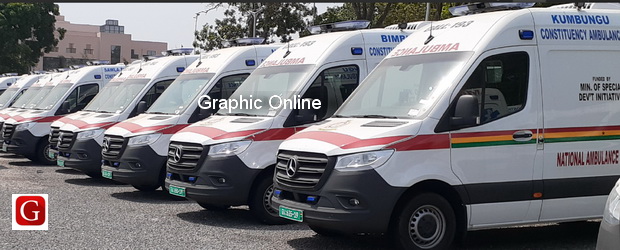
Maintenance of ambulances must be top priority
The National Ambulance Service (NAS) has started distributing 307 new, state-of-the-art ambulances to the 275 constituencies across the country.
This became possible after the President had commissioned and presented the ambulances to the NAS for distribution to the various constituencies.
By every measure, this is a piece of good news which brings to an end the needless controversies that surrounded the purchase and the distribution of the ambulances.
The ambulances were procured last year under the Infrastructure for Poverty Eradication Programme (IPEP) being executed by the Ministry of Special Development
Initiatives to enhance effective healthcare delivery in the country and their distribution was delayed for the vehicles to be fitted with advanced life-support systems and tracking devices.
We are happy to note that eventually the wait is over and the ambulances are now fit for purpose and ready for use.
While we applaud the government for fulfilling one more campaign promise, we also caution the beneficiaries to take good care of the medical emergency vehicles.
We are worried about the maintenance culture in the country, which is generally not the best, especially when a facility is state-owned.
The Daily Graphic re-echoes the President’s advice to Ghanaians to ensure that the improvement in the provision of emergency services is not abused.
We must note that the country’s scarce resources, which could have been used for some other development programme, were used to procure those ambulances and so every Ghanaian must own, preserve and keep them.
The managers of the emergency vehicles must also ensure high maintenance principles and standards.
For us at the Daily Graphic, the jubilation and fanfare experienced at the Black Star Square last Tuesday are over and we will watch closely how the ambulances are used to boost healthcare delivery in the country.
It is worth noting that all healthcare delivery services have also been put on a common platform to track the usage and performance of the ambulances, while the government has also succeeded in getting a unique emergency number — 112 — for all providers of emergency services in the country.
This will make it easier for the citizenry to access emergency health facilities.
Towards addressing the challenges confronting the NAS, we note with satisfaction that the Ministry of Finance is providing financial clearance for the service to recruit and train 1,477 emergency medical technicians, out of which 577 have already been recruited, with the process for recruiting the remaining 900 underway.
More importantly, the NAS Bill, which identifies funding sources for the service, is currently before the Cabinet and will soon be forwarded to Parliament for consideration and enactment, after Cabinet’s approval.
Furthermore, the government is providing a digitised state-of-the-art ambulance dispatch management system, integrated with the national digital property addressing system, whereby all calls to the ambulance service will be routed through a computer system, which will automatically generate the digital address location of the caller to enable the control centre to determine straightaway the nearest ambulance to dispatch.
It will also allow the ambulance to determine easily the nearest healthcare facility suitable for the emergency and provide interconnectivity among the various ambulance stations and the dispatch centres, as well as between the dispatch centres and the receiving health facilities.
Such a system will enhance the response time of the ambulances and, thereby, improve patient outcomes.
These, no doubt, are great interventionist measures and we can only support the call by President Akufo-Addo for all regional ministers, metropolitan, municipal and district chief executives, as well as all health officials, to provide the needed co-operation and support to make the operationalisation of these ambulances a success and also ensure their satisfactory maintenance to build and guarantee a world-class health delivery service for the country.
